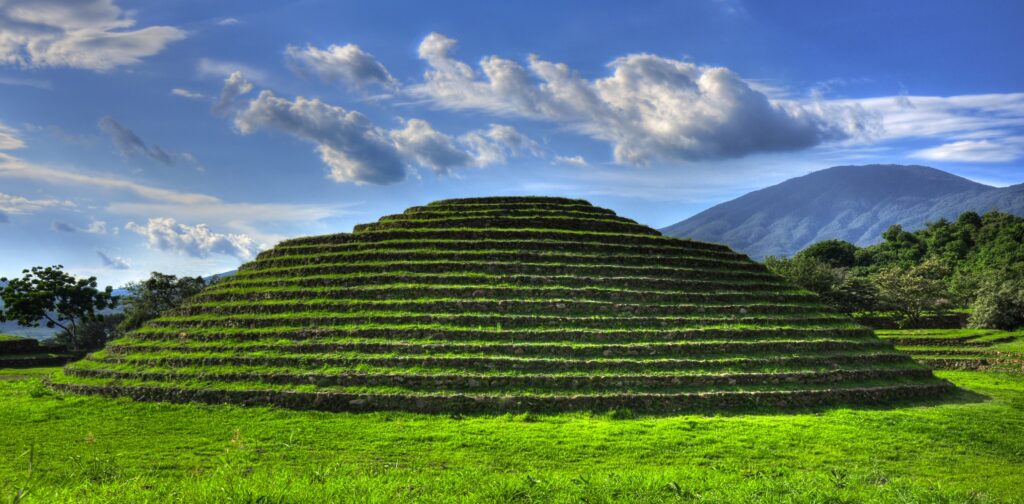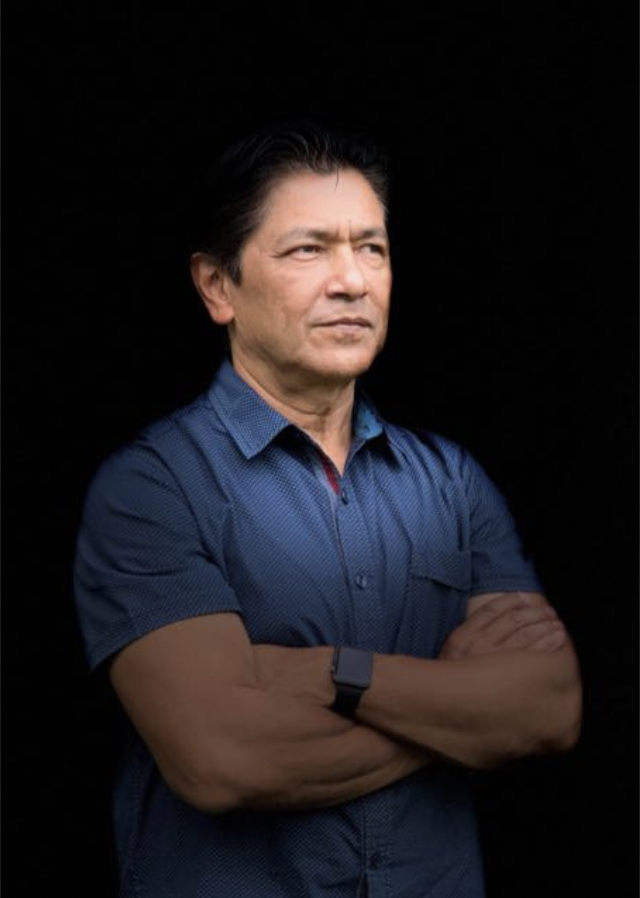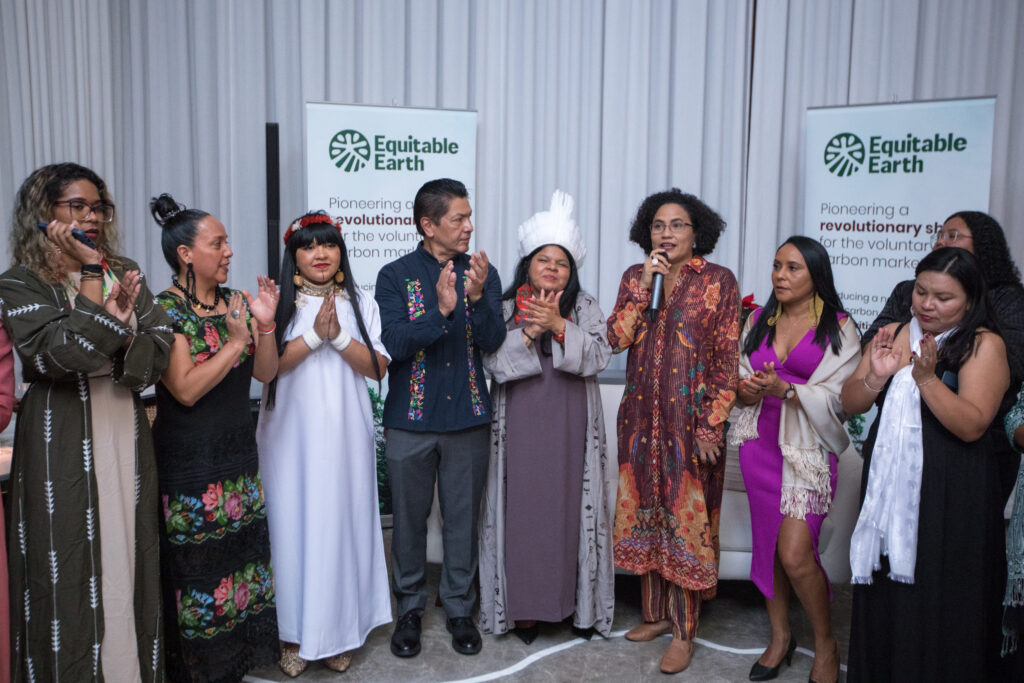
Ancient medicine and modern solutions for a new carbon standard
October 9, 2024
By Josh Berry
Magical realism saturates the rural countryside of Jalisco, Mexico, and it plays an important role in Gustavo Sánchez Valle’s work as an advocate and representative of forest communities in Latin America. Historically, magical realism in literature and art has enabled marginalized and oppressed communities to safely and powerfully express their own reality. A reality, much like the art form, that is often ignored or seen as unbelievable by authoritative and colonialist powers.
Magical realism is similarly indebted to the cosmology of indigenous and traditional cultures of Latin America. These forces are built and cultivated over thousands of years of oral history in a constant process of adaptation, resilience, knowledge sharing, and storytelling.

Gustavo Sánchez Valle is a founding member of the Indigenous Peoples and Local Communities Guidance Council at Equitable Earth. He is trained to represent and advocate for the interests of forest communities. In this work he balances the many orbits – and competing interests – of traditional communities, indigenous peoples, agroforestry companies, government agencies, small-scale farming collectives and multinational conservation groups.
This complex balance underscores the diverse realities of urban and rural, western and indigenous, industrial and artisanal. Gustavo and the communities he works with must face these influences every day. This reality is a modern-day expression of a long held tension between indigenous and colonial roots – and places like Mexico are powerful embodiments of this complex truth.
Gustavo’s hometown of Sayula is a nerve center for Mexico’s magical realism movement. It is also the hometown of the Mexican author Juan Rulfo, an internationally celebrated artist and one of the first modern writers to pioneer the literary style of magical realism for other Latin American artists such as Gabriel García Márquez, Jorge Luis Borges, and Isabel Allende.
The central municipality of Sayula was recently declared “Magical Town” – Pueblo Mágico – a title given to towns in Mexico that meet certain unique characteristics of identity, symbolism and culture.
Gustavo’s roots in this distinctive and vibrant place include his parents’ migration to Sayula and the indigenous origins of his grandmothers. His family tree dating so far back is unwritten due to the ancient oral storytelling of the region and its many people, but Gustavo’s indigenous genealogy most likely comes from the Teuchitlán tradition. This is an original culture from western Mexico that dates back at least 3,000 years.
Gustavo grew up immersed in this region that author Juan Rulfo called, “the plain in flames” due to its strong tradition of agricultural life and peasant struggles for land ownership. Gustavo Sánchez Valle and Juan Rulfo both carried this experience with them during their formative years from childhood through higher education.
Gustavo studied agricultural economics at the Chapingo Autonomous University, one of the oldest and most important agricultural schools in Latin America. The university is located near Mexico City in the historic indigenous city of Texcoco. Its campus is on land that was once a “hacienda porfirista,” a nineteenth century model of land management, dispossession and expulsion that provoked the world’s first great revolution of the twentieth century: the Mexican Revolution of 1910.
Some of this revolution’s mottos were: “land and freedom” and “the land belongs to those who work it.”
Since graduating from university, Gustavo has dedicated most of his efforts to building the Mexican Network of Peasant Forest Organizations – better known as MOCAF. He also held a brief role as a public servant, as general director of the Forestry Commission of the State of Michoacán. This role helped him develop a unique and valuable perspective on the challenges of forest and community policy, not only as a representative of forest communities but also from sitting at “the other side of the table.”
“One of the main reasons I work in this field is because of Mexico’s unique system of local community-based agricultural and land conservation collectives, which prevails in more than half of this nation’s territory. I have always been passionate about this unique part of our country’s identity.
“The collective ownership and management of a territory is crucial for all aspects of Mexican society. Far from seeing it as an obstacle, we must take advantage of the potential of this unique system for climate financing and conservation. It is a powerful opportunity for indigenous peoples and local communities.”
– Gustavo Sánchez Valle

MOCAF was established in 1994, a few years after a landmark forestry law in Mexico that recognized local communities’ rights to manage their own forests. These forests were previously granted as concessions to private companies and government agencies under the argument that local communities did not have the financial resources for forest management. One of the objectives of MOCAF is to encourage communities to take organizational and technical ownership of the care and use of their forests.
As president of the board of directors of MOCAF, Gustavo works with a wide range of organizations and community groups representing 8 distinct Indigenous Peoples and other collectives. In his work Gustavo promotes public policies favorable to ejidos (collectively owned, communally farmed land in Mexico), agrarian forest communities and small rural landowners. He also works to publicize the problems that these communities face and how their work protects forests.
MOCAF is part of the Mesoamerican Alliance of Peoples and Forests (AMPB), a platform made up of 10 indigenous and community organizations in 6 countries from Mexico to Panama. Indigenous and community organizations use this regional platform to make themselves heard in international forums and spaces. Gustavo is also the secretary of AMPB’s board of directors.
This work requires him to act as a diplomat to clearly understand and advocate for the priorities of indigenous peoples and local communities. MOCAF currently supports and represents organizations that have many focuses, including community forest management, ancestral food production systems, community and ancestral territory conservation, and fair access to markets.
In many of the MOCAF member organizations there is a growing interest in carbon markets. In a recent interview about the intersection of his work with carbon markets, Gustavo said:
“Nature-based solutions, carbon offsets and REDD+ are highly controversial in the indigenous and community world and there is no single position on the matter. When representatives [such as myself] of diverse community networks like MOCAF participate in discussions and negotiations about carbon markets, they must be very careful, and must always keep people’s rights as a top priority.
“These markets must be fair and inclusive. It is a constant challenge, but this is the complex reality we face with one foot in our indigenous and community cultures and the other foot in the hegemonic market-based economy.”
Mexico’s collective land tenure system is one of the oldest agrarian reform processes on the North American continent. Its purpose was to recover ancestral land rights and the collective management of land and territory.
This Mexican system is an important example for other countries that have navigated processes of colonization and dispossession. The spirit and importance of Mexico’s collective land tenure system lies in the fact that it restored – even if only partially – the land and territories from which indigenous peoples were dispossessed in the colonization processes.
The resilience of indigenous culture in a world dominated by free market capitalism is key to revitalizing agrarian and conservation models, in the same way that indigenous culture inspired magical realism in art and literature.

Through his work as a representative and defender of indigenous peoples, Gustavo is constantly immersed in these multiple levels of reality, learning from them and identifying new opportunities – both market-based and non-market-based – for MOCAF associates. As a founding member of the Indigenous Peoples and Local Communities Guidance Council for Equitable Earth, he expects a lot from this new standard and platform:
“What I have seen in the dozens of MOCAF Network organizations with which I work is that many people are still looking for fair market alternatives that adjust to the real conditions in which they live, to their territorial reasoning and their economies.
“I am convinced that indigenous peoples and local communities can design the new Equitable Earth forest carbon standard from the beginning to achieve great success and acceptance in a specialized market, while recognizing that society increasingly demands profitability with respect to nature and its children who protect it.
“This new standard must provide answers for those countries, like Guatemala, where legislation prevents many communities from not having land property rights and cannot directly enter a carbon market because of the widespread lack of property title transactions.
“A new norm built by specialists, companies and organizations of indigenous peoples must have a logic beyond profitability and also see the benefit of the local population. A standard that can certify conservation results, when it is not possible to handle property title certificates.
“We must stop talking in an impersonal and dehumanized way about the voluntary carbon market. We are the ones who need to create fair trade and real, concrete projects that help indigenous peoples and local communities.”
– Gustavo Sánchez Valle
Learn more about the work of MOCAF: https://redmocaf.org.mx
Stay tuned to this Equitable Earth blog for more profile stories coming soon about the other members of Equitable Earth’s Indigenous Peoples and Local Communities Guidance Council.